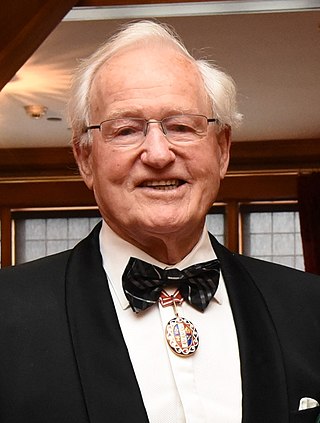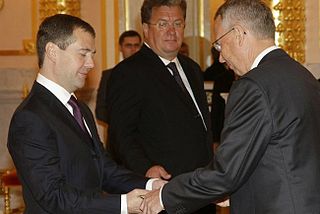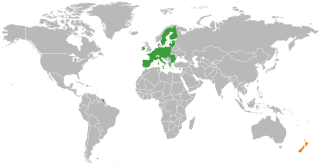
Michael Kenneth Moore was a New Zealand politician, union organiser, and author. In the Fourth Labour Government he served in several portfolios including minister of foreign affairs, and was the 34th prime minister of New Zealand for 59 days before the 1990 general election elected a new parliament. Following Labour's defeat in that election, Moore served as Leader of the Opposition until the 1993 election, after which Helen Clark successfully challenged him for the Labour Party leadership.

Dame Jennifer Mary Shipley is a New Zealand former politician who served as the 36th prime minister of New Zealand from 1997 to 1999. She was the first female prime minister of New Zealand, and the first woman to lead the National Party.

James Brendan Bolger, affectionately called The Great Helmsman, is a New Zealand retired politician of the National Party who was the 35th prime minister of New Zealand, serving from 1990 to 1997.

Sir James Kenneth McLay is a New Zealand diplomat and former politician. He served as the ninth deputy prime minister of New Zealand from 15 March to 26 July 1984. McLay was also Leader of the National Party and Leader of the Opposition from 29 November 1984 to 26 March 1986. Following his ousting as party leader, he retired from parliamentary politics in 1987. In June 2009, he became New Zealand's Permanent Representative to the United Nations. In May 2015, McLay became New Zealand's Representative to the Palestinian Authority. From May 2016 to January 2017, he was New Zealand's Consul General in Honolulu.

Timothy John Groser is a New Zealand former politician and diplomat. A member of the New Zealand National Party, Groser was a Member of Parliament between 2005 and 2015. He held the offices of Minister of Trade, Minister of Conservation, and Minister for Climate Change in the Fifth National Government.

Todd Michael McClay is a New Zealand politician and former ambassador. He is the Member of Parliament for Rotorua. He was previously an ambassador for the Cook Islands and Niue to the European Union.

Merwyn Norrish was a New Zealand diplomat who served as New Zealand's ambassador to the European Community, acting high commissioner to London, ambassador to the United States, and secretary of Foreign Affairs.

Lionel John Wood is a former New Zealand diplomat and a former chancellor of the University of Canterbury. He was Deputy Secretary of Foreign Affairs, and served two separate terms as New Zealand's Ambassador to the United States in Washington.

Terence Christopher O'Brien was a New Zealand diplomat. He led New Zealand in 1993 to a seat on the United Nations Security Council and played a strong role in helping to reshape New Zealand's perceptions of itself as a small but fiercely independent nation in the South Pacific.

Simon Peter Wallace Murdoch is a New Zealand diplomat and public servant. He was New Zealand's Secretary of Foreign Affairs and Trade and was previously New Zealand High Commissioner to Canberra, and Chief Executive of the Department of Prime Minister and Cabinet.

Zoran Jolevski is a Macedonian diplomat and the former Minister of Defense of the Republic of Macedonia. Prior to his appointment as Minister of Defense, he served as Macedonia's Ambassador to the United States of America. In November 2008, he was appointed chief negotiator to the Macedonia naming dispute, and in 2011 he was appointed Ambassador to the United Mexican States and as Permanent Representative to the Organization of American States. He served as Secretary General of the late Macedonian president Boris Trajkovski from 2000–2004. He holds a Ph.D. in International Economy from Ss. Cyril and Methodius University of Skopje. He is married to Suzana Jolevska, and together they have two sons, Pero (1988) and Filip (1992).

Major General Duncan Edward Lewis is an Australian military officer, diplomat and intelligence chief. From 2014 to 2019, he was the Director-General of Security of the Australian Security Intelligence Organisation (ASIO). Prior to that appointment, he held the post of Australian Ambassador to the Kingdom of Belgium, the Grand Duchy of Luxembourg, the European Union and the North Atlantic Treaty Organization. He is a retired Australian Army officer, and formerly Special Operations Commander Australia (2002–2004), National Security Adviser, and Secretary of the Department of Defence.

New Zealand–Russia relations are the bilateral foreign relations between New Zealand and the Russian Federation. New Zealand has an embassy in Moscow and an honorary consulate in Vladivostok. Russia has an embassy in Wellington. Both countries are members of APEC. Due to the 2022 Russian invasion of Ukraine, relations became very tense after New Zealand imposed sanctions against Russia. Russia placed New Zealand on a list of "unfriendly countries", along with South Korea, the United States, European Union members, NATO members, Australia,Singapore, Japan,Switzerland, Micronesia, Taiwan and Ukraine.

Ian Alexander Hill was a New Zealand diplomat with the New Zealand Ministry of Foreign Affairs and Trade (MFAT). He was the New Zealand Ambassador to Russia, having previously served in that position from 2009 to 2012.

Vangelis (Evangelos) Vitalis is a New Zealand diplomat and trade negotiator currently working as the Deputy Secretary for the country's Ministry of Foreign Affairs and Trade.

Mark William Christopher Higgie is a former Australian diplomat, political advisor, and intelligence analyst. Higgie is now a regular columnist on European affairs, mainly in the Australian edition of The Spectator. He was the Australian Ambassador to the European Union and NATO, Belgium, and Luxembourg between 2014 and 2017. He previously served as international advisor to the Hon Tony Abbott MP, both when Abbott was Leader of the Opposition (2010–2013) and when he was Prime Minister (2013–2014).

Duncan Alexander Webb is a New Zealand lawyer and politician. He was elected as a Member the New Zealand House of Representatives for Christchurch Central, representing the Labour Party, in the 2017 general election.

New Zealand and the European Union (EU) have solid relations and increasingly see eye-to-eye on international issues. The EU-New Zealand relations are founded on a Joint Declaration on Relations and Cooperation, first agreed in 2007. It covers not just economic relations, but broader political issues and cooperation.


















